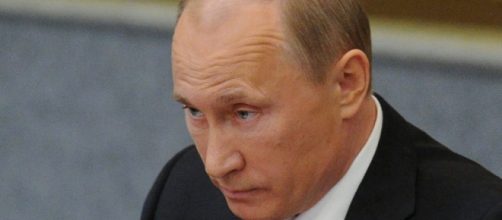RUSSIAN President Vladimir Putin took centre stage yesterday when he appeared at the General Assembly of the United Nations. The focus of his speech was Syria, and he propelled Russia to the centre of the fight against the so-called Islamic State. This sparked a dispute with other world leaders, who are cautious about Russia’s motives on the world stage.
The response from US President Barack Obama was muted, but he admitted: “The United States is prepared to work with any nation, including Russia and Iran, to resolve the conflict.”
Today the British Prime Minister, David Cameron, echoed that stance when he said: “"He is a very strong Russian nationalist.
He is very proud of what Russian stands for."
And that nationalism is at the heart of what makes Putin the leader that he is.
Putin is often portrayed as a strongman, and images have been officially disseminated of him hunting and bare-chested. He is the epitome of a modern-day Tsar, but a new book has highlighted the real roots of this modern Russian imperialism.
The book Dans la tete de Vladimir Putin [Inside the mind of Vladimir Putin] was recently published in France by Michel Eltchaninoff and traces the importance of the Russian Orthodox Church in his vision of the greater Russia.
The author, who is also the editor-in-chief of Philosophie Magazine, analyses the statements made by the Russian leader since 2000 and says he has identified a coherent ideology.
He says that, especially since 2012 and his return to the Presidency, he has tried to unite the Russian people around an ideology that is increasingly imperialist while bringing in other ideological references.
These are all important, especially for the West, as people here try to interpret his actions in Ukraine.
Eltchaninoff says: “Putin promotes the ‘Russian Dream’ and in return demands the right for total power to deliver this dream.
“He proposes this imperialism ‘a la carte’ and draws on several important and profound ideas in Russian psychology.”
The first and most important of these is the nostalgia for the old Soviet Union, something Putin has in the past said was destroyed by Gorbachev and there have even been calls for the old President to be tried for treason.
However, this nostalgia is only resonant with those over the age of 40 – Putin’s generation.
Equally, he promotes the rights of Russian speakers, even those living outside Russia.
But, according to Eltchaninoff, perhaps the key to understanding Putin is his Orthodoxy. This seems to be tied up in the Russian identity for Putin in the same way it is for Bulgarians, Serbians or even perhaps for the Greeks.
Another factor that is important is Putin’s ‘panSlavism’, in which he sees the importance of the unity of the Slavic peoples to assert their identity in the face of Westerners.
A final piece of the jigsaw: his view of the Eurasia Project. Since the 1920s Russia has defended the idea of a continent that is neither European nor Asian.
Instead this is Eurasia, which is fundamentally a part of both.
This idea of the Slavophile has existed in Russia since the start of the 19th Century and it is a buffer to the idea that Russia is part of the West.
This underlines the importance of a separate Russian tradition that is founded on the important bases of its own culture, social setting and religion. So Putin does not want Russia to see itself as part of the West, nor of the East. This is what he is defending.
But Eltchaninoff says that the ideas Putin is promoting is a patchwork ideology and can, in fact, play out in different directions. But for the most part it is highly imperialist and highly military.

